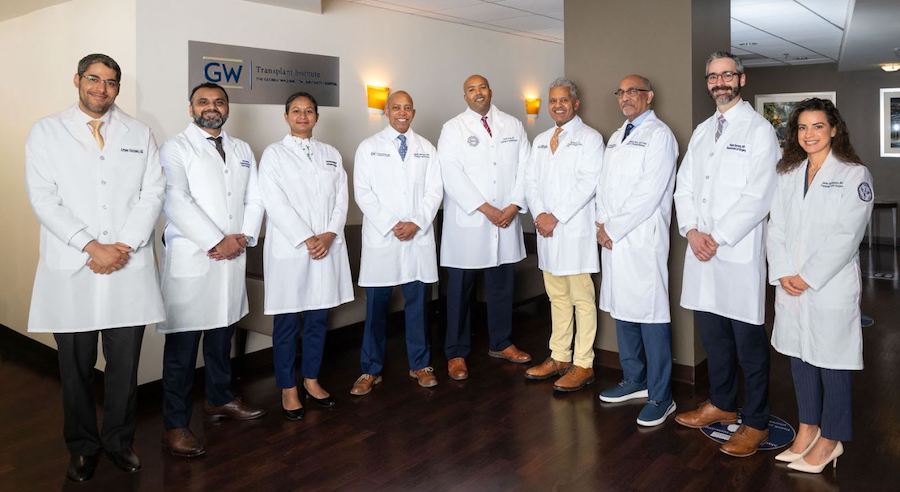Making Liver Transplants Accessible in Washington, DC
When it comes to liver care, there’s no need to search all over the region. Turn to GW Hospital for comprehensive services in one place, now including liver transplantations.
The GW Transplant Institute
The GW Transplant Institute is now Washington, DC’s newest location for liver transplants, increasing the accessibility to care within the DC Metropolitan region. We offer deceased liver transplant surgery to patients who are evaluated by the GW Transplant Institute and listed with the United Network for Organ Sharing (UNOS).
We are located in the heart of D.C. and easily accessible by bus and Metro.
Schedule an in-person or virtual appointment
Are you a potential patient? For information on patient referrals, the management of your liver disease or possible transplantation, please fill out our general appointment form below or call 202-715-5168 to schedule an in-person or virtual appointment. Virtual Health enables you to speak with providers using your phone, tablet or computer.
Are you a physician? To refer a patient or speak to our specialists, call 202-715-5168 or fax referrals to 202-715-4663.
Liver Transplant Program
Watch this video to learn more about our program and the services we offer:
Liver transplant criteria
According to the American Liver Foundation, there are approximately 5.5 million Americans living with chronic liver disease or cirrhosis and over 14,000 people in the U.S. currently waiting for a liver transplant. If your liver is no longer functioning properly to keep you alive, you may need a liver transplant. Here is the process for being evaluated for a liver transplant.
Transplant evaluation
 You will need a referral from your primary physician to begin an evaluation, or you may obtain a self-referral by calling the GW Transplant Institute at 202-715-5168. We will obtain your records and arrange an in-person interview.
You will need a referral from your primary physician to begin an evaluation, or you may obtain a self-referral by calling the GW Transplant Institute at 202-715-5168. We will obtain your records and arrange an in-person interview.
The evaluation starts with an initial consultation with the transplant team. The main goals of the consultation are to determine if:
- You have a liver disease for which transplantation is the best treatment
- Your overall condition is such that you can safely undergo transplantation
During the initial consultation, you will receive a thorough overview of liver disease, organ allocation and transplant outcomes, as well as an overview of GW Hospital’s program and personnel. Finally, the transplant coordinator outlines the medical tests and consultations that must be performed as part of the evaluation process.
Next, the transplant hepatologist and surgeon take a complete medical history from you, conduct a physical exam and review all the outside records, tests and consultations you have previously had done. Additional imaging, cardiovascular and health maintenance exams will be ordered based on prior work-up, other health conditions and liver disease severity. The transplant hepatologist will assess the nature and severity of your liver disease, the state of your general health and whether liver transplantation is a suitable therapy for you. We may discuss alternative therapies to transplantation and how to best medically manage your liver condition.
Our transplant social worker will conduct a full evaluation including an assessment of your personal support system. If you have a history of dependence on alcohol or illicit drugs, we will expect you to comply with the Transplant Institute's policies and procedures with respect to relapse prevention.
Once all the testing and consultations are complete, the Liver Transplant Program's multidisciplinary committee reviews your case to determine that no other treatment options are available and that you have no contraindications (such as heart disease or lung disease). Following that review and approval, you are placed on the United Network for Organ Sharing (UNOS) transplant list.
Waiting for an organ
There is no way to know how long you will have to wait before a deceased donor liver becomes available for you. It could be months or years, and depends on many factors. Waiting may be difficult. It helps to remember that once you get the phone call about a possible match, things will move very quickly.
Patients have an important role to play in the transplantation process. During the wait, it is critically important that you:
- Provide blood samples on a timely basis
- Keep all studies up to date, as indicated in the instructions we provide
- Keep us informed of any health changes; these changes (such as recently diagnosed conditions or other surgeries) can affect your ability to receive a transplant
- Ensure we always have the latest insurance information so we can stay on top of any changes in the financial situation
- Contact us with any changes to phone numbers and/or address; just as important, you must leave your phone on around the clock so they can be reached if and when a potential organ becomes available
If we can't reach you, if tests or blood work aren't up to date or if insurance coverage has changed, it could mean the difference between receiving an organ, and continuing to wait.
Liver transplant survival rate
 You can expect to return to normal activities within 6-12 months after the transplant. How long you will live after a liver transplant depends on many factors, but the current five-year survival rate is about 75 percent and continues to improve, according to the American Liver Foundation.
You can expect to return to normal activities within 6-12 months after the transplant. How long you will live after a liver transplant depends on many factors, but the current five-year survival rate is about 75 percent and continues to improve, according to the American Liver Foundation.
To improve your chances for a positive outcome, you should:
- Show up for all medical appointments
- Take all your medications as prescribed
- Learn the signs of rejection and report them to your doctor
- Avoid people who have a contagious illness
- Maintain a healthy lifestyle, such as eating well, exercising regularly and not drinking or smoking
Surgical options for liver conditions
The GW Transplant Institute offers liver transplant surgery and a variety of other surgical procedures using advanced technology and equipment, including:
- Deceased donor liver transplantations: A patient receives a transplant from a deceased donor.
- Hepatobiliary surgeries: This includes surgeries to treat diseases and conditions of the liver, pancreas, gallbladder and bile duct.
Liver services
We offer comprehensive liver care services, including treatment for:
- Acute liver failure
- Autoimmune hepatitis
- Cholestatic and autoimmune liver disease
- Cirrhosis (chronic liver disease)
- Elevated liver enzymes
- Gastrointestinal disorders
- Hepatocellular carcinoma
- Immunosuppression
- Liver cancer
- Liver damage due to alcohol
- Non-alcoholic fatty liver disease
- Portal hypertension complications
- Viral hepatitis (hepatitis B and C)
The GW Liver and Pancreas Institute for Quality (LPIQ)
GW Hospital also offers innovative and advanced treatments for patients with pancreas, liver, bile duct, duodenum and gallbladder diseases at the Liver and Pancreas Institute for Quality (LPIQ).
Meet the Medical Team

Pictured left to right: Ameer Abutaleb, MD, Hepatologist, Liver Transplantation; Zahid Vahora, MD, Medical Director, Liver Transplantation; Divya Shankaranarayanan, MD, Medical Director, Pancreas Transplantation; Lynt Johnson, MD, Executive Director, The Liver and Pancreas Institute for Quality; Stephen Gray, MD, Surgical Director, Liver Transplantation; Keith Melancon, MD, Director of Transplantation, GW Hospital; Muralidharan Jagadeesen, MD, Medical Director, GW Transplant Institute; Pablo Serrano, MD, Surgical Director, Pancreas Transplantation; Jamie Robinson, MD, Surgeon, Liver Transplantation
Learn more about the members of our transplant team →
How to prepare for your appointment
- Download, print and complete the New Patient Assessment form.
- Bring the completed form with you to your appointment.
- Plan to arrive 30 minutes before your scheduled appointment time.
- Bring a list of all medications you are currently taking.
- Bring your ID and insurance card.
